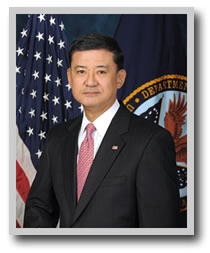
By Eric Shinseki
For 38 years, I was privileged to serve the men and women entrusted with our nation’s security. The character of their service is reflected in something called The Soldier’s Creed. Most everyone I have met who is familiar with its four key lines agrees that they define the essence of uniformed service:
I will always place the mission first;
I will never accept defeat;
I will never quit;
I will never leave a fallen comrade.
Four simple, declaratory statements — promises that form the foundation for trust within military formations.
Especially in time of war, those who wear our nation’s uniforms and their families bear incredible burdens for us. A new generation faces the demand for courage, strength, dedication and stamina — as daunting today as it has ever been. Failure is never an option. Our servicemembers have never failed the nation, the mission, or their comrades.
But the toll for this kind of loyalty and dedication is high. Troops are returning with invisible wounds that can be as debilitating as any physical battlefield trauma. As in every conflict in our nation’s history, today’s warriors are suffering emotional injuries just as they do physical ones.
The residual effects of combat manifest themselves in every combatant’s life. You have to be strong to prevail. You must be loved, respected and supported to weather the worst of the storms. You must be patient, and it helps to be lucky. And you must have the strong, unwavering support of the nation that sent you on those missions.
At the Department of Veterans Affairs (VA) there is only one goal — to ensure that veterans of every generation receive the best possible health care and the benefits they have earned.
Previously, veterans filing for health care and disability benefits for post-traumatic stress disorder (PTSD) were required to document in detail the causes of their symptoms. These have traditionally been called “stressors.”
The rules stringently required veterans, who served in the combat branches of the military, where the likelihood of direct action against an armed enemy was highest, to provide detailed documentation of those engagements. For those not serving in the combat branches, the burden of proof was even higher. But in either case, these rules were neither fair nor sustainable.
At VA, we’re now moving to treat all veterans equally. On Monday, VA begins simplifying the process by which veterans with PTSD are able to access health care and receive benefits.
Streamlining this process will help not just the veterans of Operations Enduring Freedom and Iraqi Freedom, but generations of veterans who have previously “borne the battle” for our nation.
We’re publishing a regulation Monday in the Federal Register that simplifies the process for claiming service connection for PTSD by reducing the documentation needed for veterans to validate the specifics of place, type and circumstance of incident. From this point forward, VA will not require corroboration of a PTSD stressor related to fear of hostile military or terrorist activity, if a VA doctor confirms a diagnosis of PTSD and the stressful experience recalled by the veteran adequately supports that diagnosis.
This decision to simplify the process has been validated by an Institute of Medicine study, which concluded that service in a war zone is inherently linked to increased risk of PTSD.
As President Obama has said, “Just as we have a solemn responsibility to train and equip our troops before we send them into harm’s way, we have a solemn responsibility to provide our veterans and wounded warriors with the care and benefits they’ve earned when they come home. That is our sacred trust with all who serve — and it doesn’t end when their tour of duty does.”
In Profiles in Courage, President John F. Kennedy, himself a combat veteran, noted, “Without belittling the courage with which men have died, we should not forget those acts of courage with which men … have lived. The courage of life … is no less a magnificent mixture of triumph and tragedy.”
The courage to deal with the effects of battle is real, and it takes courage and determination to mitigate its effects once we return from operations. It has been so for every generation of warriors.
Simplifying the documentation needed to receive medical care and compensation for service connected to PTSD upholds our commitment to those who protect our freedoms — not just the veterans of Afghanistan and Iraq, but all generations of veterans, who proudly served and sacrificed in their time.
Eric Shinseki is secretary of the U.S. Department of Veterans Affairs.
ATTENTION READERS
We See The World From All Sides and Want YOU To Be Fully InformedIn fact, intentional disinformation is a disgraceful scourge in media today. So to assuage any possible errant incorrect information posted herein, we strongly encourage you to seek corroboration from other non-VT sources before forming an educated opinion.
About VT - Policies & Disclosures - Comment Policy



